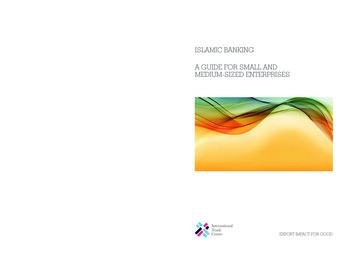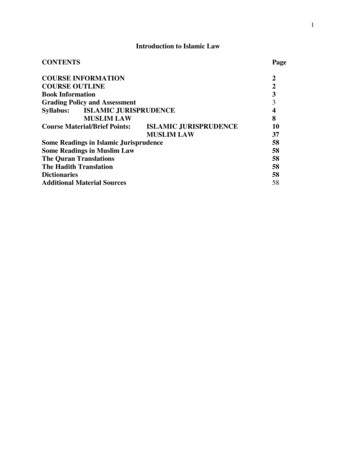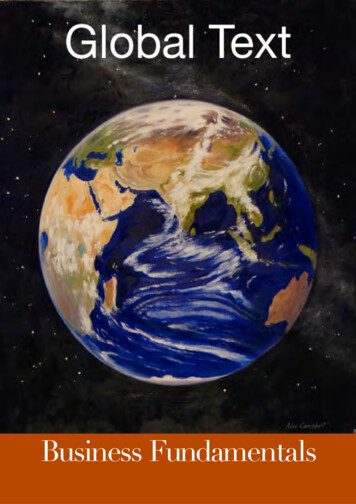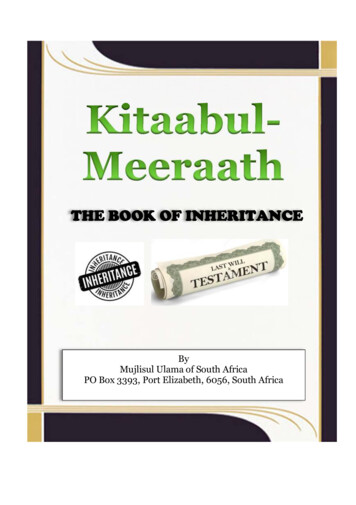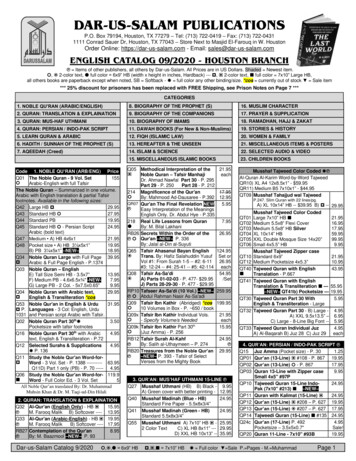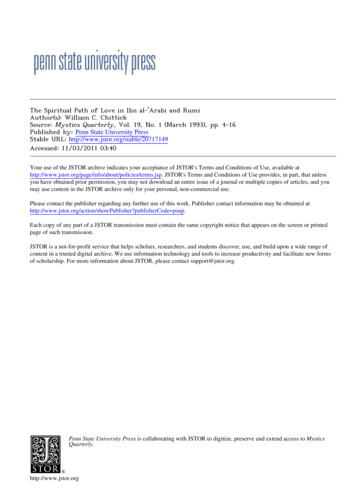
Transcription
The Fundamentals of Tawheed (IslamicMonotheism)Abu Ameenah Bilal PhilipsThe Muslim scholar Abu Ameenah Philips has kindly agreed to let MSA-USC display threechapters (1, 2, and 10) from his book "The Fundamentals of Tawheed (Islamic Monotheism)".This book is highly recommended reading for those who would like to learn about the basis ofIslam: there is no being worthy of worship except Allah (God), and Allah is Absolutely One andAbsolutely Unique. We note also that a Muslim is further obligated to accept the ProphetMuhammad (saws) as Allah's final prophet to humanity.1. CHAPTER ON THE CATEGORIES OF TAWHEEDLiterally Tawheed means "unification" (making something one) or "asserting oneness", and itcomes from the Arabic verb (wahhada) which itself means to unite, unify or consolidate.1However, when the term Tawheed is used in reference to Allaah (i.e. Tawheedullaah2), it meansthe realizing and maintaining of Allaah's unity in all of man's actions which directly or indirectlyrelate to Him. It is the belief that Allaah is One, without partner in His dominion and His actions(Ruboobeeyah), One without similitude in His essence and attributes (Asmaa wa Sifaat), and Onewithout rival in His divinity and in worship (Ulooheeyah/'Ebaadah). These three aspects form thebasis for the categories into which the science of Tawheed has been traditionally divided. The threeoverlap and are inseparable to such a degree that whoever omits any one aspect has failed tocomplete the requirements of Tawheed. The omission of any of the above mentioned aspects ofTawheed is referred to as "Shirk" (lit. sharing); the association of partners with Allaah, which, inIslamic terms, is in fact idolatry.The three categories of Tawheed are commonly referred to by the following titles:1. Tawheed ar-Ruboobeeyah (lit. "Maintaining the Unity of Lordship")2. Tawheed al-Asmaa was-Sifaat (lit. "Maintaining the Unity of Allaah's Names and Attributes")3. Tawheed al-'Ebaadah (lit. "Maintaining the Unity of Allaah's Worship")3The division of Tawheed into its components was not done by the Prophet (saws) nor by hiscompanions, as there was no necessity to analyze such a basic principle of faith in this fashion.However, the foundations of the components are all implied in the verses of the Qur'aan and in theexplanatory statements of the Prophet (saws) and his companions, as will became evident to thereader when each category is dealt with in more detail later in this chapter.The necessity for this analytical approach to the principle of Tawheed arose after Islaam spreadinto Egypt, Byzantium, Persia and India and absorbed the cultures of these regions. It is onlynatural to expect that when the peoples of these lands entered the fold of Islaam, they would carrywith them some of the remnants of their former beliefs. When some of these new converts began to
express in writings and discussions, their various philosophical concepts of God, confusion arosein which the pure and simple unitarian belief of Islaam became threatened. There were also otherswho had outwardly accepted Islaam but secretly worked to destroy the religion from within, due totheir inability to oppose it militarily. This group began to actively propagate distorted ideas aboutAllaah among the masses in order to tear down the first pillar of Eemaan (faith) and with it Islaamitself.According to Muslim historians, the first Muslim to express the position of man's free-will and theabsence of destiny (Qadar) was an Iraqi convert from Christianity by the name of Sausan. Sausanlater reverted to Christianity but not before infecting his student, Ma'bad ibn Khaalid al-Juhaneefrom Basrah. Ma'bad spread the teachings of his master until he was caught and executed by theUmayyad Caliph, 'Abdul-Malik ibn Marwaan (685-705), in the year 700 CE.4 The youngerSahaabah (companions of the Prophet (saws)) who were alive during this period, like 'Abdullaahibn 'Umar (d. 694 CE) and 'Abdullaah in Abee Awfaa (d. 705CE), advised the people not to greetthose who denied destiny nor make funeral prayers for those of them who died. That is, theyconsidered them to be disbelievers.5 However, Christian philosophical arguments for free-willcontinued to find new supporters. Ghailaan ibn Muslim from Damascus studied under Ma'bad andchampioned the cause of free-will until he was brought before Caliph 'Umar ibn 'Abdul-'Azeez(717-720CE). He recanted his beliefs publicly, however, [and] on the caliph's death, he resumedteaching free-will. The following caliph, Hishaam ibn 'Abdul-Malik (724-743CE), had himarrested, tried and executed.6 Another prominent figure in this controversy was al-Ja'd ibn Dirham,who not only supported the philosophy of free-will, but also attempted to re-interpret the Qur'anicverses containing descriptions of Allaah's qualities according to neo-platonic philosophy. Al-Ja'dwas at one point a tutor for the Umayyad prince, Marwaan ibn Muhammad, who later became thefourteenth caliph (744-750CE). During his lectures in Damascus, he openly denied some ofAllaah's attributes, like seeing, hearing etc., until the Umayyad governor expelled him.7 He thenfled to Kufah, where he continued to propound his ideas and gather followers until his hereticalopinions became widely publicized and the Umayyad governor, Khaalid ibn Abdillaah, had himpublicly executed in 736 CE. However, his main disciple, Jahm ibn Safwaan, continued to defendhis master's doctrines in philosophical circles in Tirmiz and Balakh, when his heresies becamewidespread, he was executed by the Umayyad governor, Nasr ibn Sayyaar, in 743CE.8The early caliphs and their governors were closer to Islamic principles and the consciousness ofthe masses was higher due to the presence of the Prophet's companions and their students. Hence,the demand for the elimination of open heretics received immediate response from the rulers. Incontrast, the later Umayyad caliphs were more corrupt and as such cared little about such religiousissues. The masses were also less Islamically conscious and thus were more susceptible to deviantideas. As greater numbers of people entered Islaam, and the learning of an increasing number ofconquered nations was absorbed, the execution of apostates was no longer used to stem the risingtide of heresy. The task of opposing the tide of heresy fell on the shoulders of the Muslim scholarsof this period who rose to meet the challenge intellectually. They systematically opposed thevarious alien philosophies and creeds by categorizing them and countering them with principlesdeduced from the Qur'aan and the Sunnah. It was out of this defense that the science of Tawheedemerged with its precisely defined categories and components. This process of specializationoccurred simultaneously in all of the other areas of Islamic knowledge as it has done in the varioussecular sciences of today. Therefore, as the categories of Tawheed are studied separately and in
more depth, it must not be forgotten that they are all a part of an organic whole which is itself thefoundation of a greater whole, Islaam itself.Tawheed ar-Ruboobeeyah (Maintaining the Unity of Lordship)This category is based on the fundamental concept that Allaah alone caused all things to existwhen there was nothing; He sustains and maintains creation without any need from it or for it; andHe is the sole Lord of the universe and its inhabitants without any real challenge to Hissovereignty. In Arabic the word used to describe this creator-sustainer quality is Ruboobeeyahwhich is derived from the root "Rabb" (Lord). According to this category, since God is the onlyreal power in existence, it is He who gave all things the power to move and to change. Nothinghappens in creation except what He allows to happen. In recognition of this reality, ProphetMuhammad (saws) used to often repeat the exclamatory phrase "La hawla wa laa quwwata illaabillaah" (There is no movement nor power except by Allaah's will).The basis for the Ruboobeeyah concept can be found in many Qur'anic verses. For example, Allaahsays:"Allaah created all things and He Is the agent on which all things depend."9"And Allaah created you all and whatever you do."10"It was not you who threw, when you threw, but it was Allaah who threw."11"And no calamity strikes except by Allaah's permission."12The Prophet (saws) further elaborated on this concept saying, "Be aware that if the whole ofmankind gathered together in order to do something to help you, they would only be able to dosomething for you which Allaah had already written for you. Likewise, if the whole of mankindgathered together to harm you, they would only be able to do something to harm you which Allaahhad already written to happen to you"13Thus, what man conceives as good fortune and misfortune are merely events predestined by Allaahas part of the tests of this life. The incidents follow patterns set only by Allaah. Allaah has said inthe Qur'aan,"O Believers! Surely there Is In your wives and children an enemy for you, sobeware of them."14That is, within the good things of this life there are severe tests of one's faith in God. Likewise, inthe terrible events of life there lies test as is mentioned in the verse,"Surely We will test you with fear, hunger, loss of wealth and life and the fruits ofyour work, so give glad tidings to those who are patient."15Sometimes the patterns are recognizable, as in the case of cause and effect relationships, andsometimes they are not, as in the case when apparently good results come from evil means or bad
results from good means. God has explained that the wisdom behind these apparent irregularities isoften beyond man's immediate comprehension due to his limited scope of knowledge."Perhaps you may dislike something which is really good for you or like somethingbad for you, but Allaah knows (what is best for you), and you do not."16Apparently evil events in human lives sometimes turn out to be for the best and apparently goodthings which people desire turn out to be harmful. Consequently, man's realm of influence in thecourse of events which make up his life is limited to the mental choice between options presentedto him and not the actual results of his choice. In other words "man proposes and God disposes".Apparent "good fortune" and "misfortune" are both from Allaah and can not be caused by goodluck charms such as rabbit's feet, four-leaf clovers, wishbones, lucky numbers, zodiacal signs, etc.,or by omens of bad luck like Friday the thirteenth, breaking mirrors, black cats, etc. In fact, thebelief in charms and omens is a manifestation of the grave sin of Shirk (association) in this form ofTawheed. 'Uqbah, one of the companions of the Prophet (saws), reported that once a group of menapproached Allaah's messenger to give their allegiance to him, and he accepted the oath from nineof them but refused to accept it from one. When they asked him why he refused their companion'soath, he replied, "Verily, he is wearing an amulet"17 The man who was wearing the amulet put hishand in his cloak, pulled the amulet off and broke it then made the oath. The Prophet (saws) thensaid, "Whoever wears an amulet has committed Shirk."18As for using the Qur'aan like a charm or amulet by wearing or carrying Qur'anic verses on chainsor in pouches to ward off evil or to bring good fortune, there is little difference between suchpractices and those of the pagans. Neither the Prophet (saws) nor his Companions used the Qur'aanin this fashion, and the Prophet (saws) said, "Whoever innovates in Islaam something which doesnot belong to it will have it rejected."19 It is true that the Qur'anic chapters, an-Naas and al-Falaq,were revealed specifically for exorcism (that is, for removing evil spells), but the Prophet (saws)demonstrated the proper method by which they should be used. On an occasion when a spell hadbeen cast on him, he told 'Alee ibn Abee Taalib to recite the two chapters verse by verse and whenhe became ill he used to recite them on himself.20 He did not write them down and hang themaround his neck, tie them on his arm or around his waist, nor did he tell others to do so.Tawheed al-Asmaa was-Sifaat (Maintaining the Unity of Allaah's Namesand Attributes).This category of Tawheed has five main aspects:1. For the unity of Allaah's names and attributes to be maintained in the first aspect, Allaah must bereferred to according to how He and His Prophet (saws) have described Him without explainingaway His names and attributes by giving them meanings other than their obvious meanings. Forexample, Allaah in the Qur'aan says He gets angry with the disbelievers and the hypocrites. Hesays:
"That He may punish the hypocrites, men and women, and the pagans men andwomen, who have an evil opinion of Allaah. A circle of evil is around them; Allaahis angry with them, curses them and has prepared for them an evil end."21Thus, anger is one of God's attributes. It is incorrect to say that His anger must mean Hispunishment since anger is a sign of weakness in man and, as such, not befitting of Allaah. WhatAllaah has stated should be accepted with the qualification that His anger is not like human anger,based on Allaah's statement, "There is nothing like him".22 The process of so-called "rational"interpretation when taken to its logical conclusion results in the denial of God's very existence.For, Allaah describes Himself as living and man lives, therefore, according to the rationalistargument, God is neither living nor existing. The fact is that the similarity between God's attributesand those of mankind is only in name and not in degree. When attributes are used in reference toGod, they are to be taken in the absolute sense, free from human deficiencies.2. The second aspect of Tawheed al-Asmaa was-Sifaat involves referring to Allaah as He hasreferred to Himself without giving Him any new names or attributes. For example, Allaah may notbe given the name al-Ghaadib (the Angry one), in spite of the fact that He has said that He getsangry, because neither Allaah nor His messenger has used this name. This may seem to be a veryfine point, but it must be maintained in order to prevent the false description of God. That is, finiteman is in no position to define the infinite Lord of creation.3. In the third aspect of Tawheed al-Asmaa was-Sifaat Allaah is referred to without giving Him theattributes of His creation. For example, it is claimed in the Bible and Torah that Allaah spent thefirst six days creating the universe then slept on the seventh.23 For this reason, Jews and Christianstake either Saturday or Sunday as a day of rest in which work is looked at as a sin. Such a claimassigns to God the attributes of His creation. It is man who tires after heavy work and needs sleepto recuperate.24 Elsewhere in the Bible and Torah, God is portrayed as repenting for His badthoughts in the same way that humans do when they realize their errors.25 Similarly the claim thatGod is a spirit or has a spirit completely ruins this area of Tawheed. Allaah does not refer toHimself as a spirit anywhere in the Qur'aan nor does His Prophet (saws) express anything of thatnature in Hadeeth. In fact, Allaah refers to the spirit as part of His creation.26The key principle which should be followed when dealing with Allaah's attributes is the Qur'anicformula,"There is nothing like Him and He is hearer and seer of all."27The attributes of hearing and seeing are among human attributes, but when they are attributed toThe Divine Being they are without comparison in their perfection. However, when these attributesare associated with men they necessitate ear and eye apparatuses which can not be attributed toGod. What man knows about the Creator is only what little He has revealed to him through Hisprophets. Therefore, man is obliged to stay within these narrow limits. When man gives free rein tohis intellect in describing God, he is liable to fall into errors by assigning to Allaah the attributes ofHis creation.
In their love of pictorial representations, Christians have painted, carved and molded innumerablehuman likenesses and called them images of God. These have served to pave the way for theacceptance of Jesus' divinity among the masses. Once they accepted the conception of the Creatoras being like a human being, accepting Jesus as God presented no real problem.4. The fourth aspect of Tawheed al-Asmaa was-Sifaat requires that man not be given the attributesof Allaah. For example, in the New Testament Paul takes the figure of Melchizedek, king of Salem,from the Torah (Genesis 14:18-20) and gives both him and Jesus the divine attribute of having nobeginning or end,"1 For this Melchizedek, king of Salem, priest of the most high God, metAbraham returning from the slaughter of the kings and blessed him,2 andto him Abraham apportioned a tenth part of everything. He is first, bytranslation of his name, king of righteousness, and then he is also king ofSalem, that is, king of peace.3 He is without father or mother orgenealogy, and has neither beginning of days nor end of life, butresembling the son of God he continues a priest forever."28"5 So also Christ did not exalt himself to be made a high priest, but wasappointed by him who said to him, 'Thou art my son, today I havebegotten thee'; 6 as he says also in another place, 'Thou art a priest forever, after the order of Melchizedek'.29Most Shi'ite sects (with the exception of the Zaidites of Yemen) have given their "Imaams" divineattributes of absolute infallibility,30 knowledge of the past, the future and the unseen, the ability tochange destiny31 and control over the atoms of creation.32 In so doing they set up rivals whoshare God's unique attributes and who, in fact, become gods besides Allaah.5. Maintaining the unity of Allaah's names also means that Allaah's names in the definite formcannot be given to His creation unless preceded by the prefix 'Abd meaning "slave of" or "servantof'. Many of the Divine names in their indefinite form like Ra'oof and Raheem are allowable namesfor men because Allaah has used some of them in their indefinite forms to refer to the Prophet(saws):"A messenger has come to you from among yourselves to whom anything whichburdens you is grievous. He is full of concern for you and is full of pity (Ra'oof) andfull of mercy (Raheem)".33But ar-Ra'oof (the One Most Full of Pity) and ar-Raheem (the Most Merciful) can only be used torefer to men if they are preceded by 'Abd as in 'Abdur-Ra'oof or 'Abdur-Raheem, since in thedefinite form they represent a level of perfection which only belongs to God. Similarly, names like'Abdur-Rasool (slave of the messenger), 'Abdun-Nabee (slave of the Prophet), 'Abdul-Husayn(slave of Husayn), etc.,where people name themselves slaves to other than Allaah are also
forbidden. Based on this principle, the Prophet (saws) forbade Muslims from referring to those putunder their charge as 'Abdee (my slave) or Amatee (my slave girl).34Tawheed al-'Ebaadah (Maintaining The Unity of Worship)In spite of the wide implications of the first two categories of Tawheed, firm belief in them alone isnot sufficient to fulfill the Islamic requirements of Tawheed. Tawheed ar-Ruboobeeyah andTawheed al-Asmaa was-Sifaat must be accompanied by their complement, Tawheed al-'Ebaadah,in order for Tawheed to be considered complete according to Islaam. This point is substantiated bythe fact that Allaah Himself has related in clear terms that the Mushrikoon (idolators) of theProphet's time confirmed many aspects of the first two forms of Tawheed. In the Qur'aan Allaahtells the Prophet (saws) to say to the pagans:"Say: 'Who is it that gives you all sustenance from the sky and earth, governs sightand hearing, brings forth life from dead (matter) and death from the living, and plansthe affairs of man?' They will all say 'Allaah'."35"If you asked them who created them, they would surely say, 'Allaah' "36"If you asked them who brings down water from the sky and with it brings the earthto life after its death? They will most certainly say, 'Allaah'."37The pagan Makkans all knew that Allaah was their creator, sustainer, their Lord and Master yet thatknowledge did not make them Muslims according to God. In fact, Allaah said:"Most of them do not believe in Allaah except while joining partners to Him."38Mujaahid's39 commentary on this verse was as follows: "Their belief in Allaah represented bytheir statement, 'Allaah created us, provides for us and takes our lives', did not stop them fromworshipping other gods along with Allaah."40 From the previously mentioned verses, it is clearthat the Kuffaar (disbelievers) knew of Allaah's sovereignty, dominion and power. In fact, theyused to faithfully devote various types of worship to Him like Hajj, charity, animal sacrifices, vowsand even prayers in times of dire necessity and calamity. They even used to claim that they werefollowing the religion of Abraham. Because of that claim, Allaah revealed the verse:"Abraham was not a Jew nor was he a Christian, but (he) was a true Muslim and notamong those who joined partners with Allaah."41Some pagan Makkans even believed in the Resurrection and the Judgement and others inpredestination (Qadar). Ample evidence of their belief can be found in pre-Islamic poetry. Forexample, the poet Zuhayr was reported to have said:"It is either delayed, placed in a book and saved for the Day of Judgement orhastened and avenged."'Antarah was quoted as saying:
"O 'Ebil to where will you run from death, if my Lord in the sky has destined it?"42In spite of the Makkans' confessions of Tawheed and their knowledge of Allaah, Allaah classifiedthem as disbelievers (Kuffaar) and pagans (Mushrikoon) simply because they worshipped othergods along with their worship of Allaah.Consequently, the most important aspect of Tawheed is that of Tawheed al-'Ebaadah, maintainingthe unity of Allaah's worship. All forms of worship must be directed only to Allaah because Healone deserves worship, and it is He alone who can grant benefit to man as a result of His worship.Furthermore, there is no need for any form of intercessor or intermediary between man and God.Allaah emphasized the importance of directing worship to Him alone by pointing out that this wasthe main purpose of man's creation and the essence of the message brought by all the prophets.Allaah says:"I did not create the Jinn and Mankind except for My worship."43"Verily, We have sent to every nation a messenger (saying), 'Worship Allaah andavoid false gods'."44Understanding the purpose of creation in a complete sense is beyond man's innate abilities. Man isa finite created being and can not reasonably hope to fully comprehend the actions of the infiniteCreator. Hence, God made it a part of man's nature to worship Him, and He sent prophets andbooks of divine revelation to clarify the aspect of the purpose of creation which was within man'smental ability to grasp. That purpose is, as was previously mentioned: the worship of God('Ebaadah) and the main message of the prophets was to worship God alone, Tawheedal-'Ebaadah. Consequently, the gravest sin is Shirk, the worship of others instead of Allaah oralong with Allaah. In Soorah al-Faatihah, which every Muslim is required to recite in his or herprayers at least seventeen times daily, verse four reads, "You alone do we worship and from Youalone do we seek help". A clear statement that all forms of worship should only be directed to theOne who can respond, Allaah. The Prophet Muhammad (saws) confirmed the concept of unity ofworship saying, "If you ask in prayer ask only Allaah, and if you seek help, seek it only fromAllaah."45 The absence of any need for intercession is further emphasized by the many versesindicating His closeness to man. For example:"When My servants ask you (O Muhammad) about Me (tell them), 'Verily I am close(to them), I listen to the prayer of every one who calls on Me. So let them respond toMe and believe In Me in order that they may he guided aright."46"It is We who created man and We know what his soul whispers to him, for We arenearer to him than his jugular vein."47The confirmation of Tawheed al-'Ebaadahconversely necessitates the denial of all formsof intercession or association of partners with
Allaah. If someone prays to the dead seekingtheir influence on the lives of the living or thesouls of those who have passed away, theyhave associated a partner with Allaah, becauseworship is being shared between Allaah andHis creation. The Prophet Muhammad (saws)said, in no uncertain terms, "Prayer (du'aa) isworship."4The Fundamentals of Tawheed(Islamic Monotheism)Abu Ameenah Bilal PhilipsThe Muslim scholar Abu Ameenah Philips has kindly agreed to let MSA-USC display threechapters (1, 2, and 10) from his book "The Fundamentals of Tawheed (Islamic Monotheism)".This book is highly recommended reading for those who would like to learn about the basis ofIslam: there is no being worthy of worship except Allah (God), and Allah is Absolutely One andAbsolutely Unique. We note also that a Muslim is further obligated to accept the ProphetMuhammad (saws) as Allah's final prophet to humanity.8 And, Allaah, Most Great and Glorious, said:'Do not worship besides Allaah that which can not help or harm you."49"Those on whom you call besides Allaah are only slaves like yourselves."50If someone prays to the Prophet (saws), to so-called saints, Jinns or angels asking for help orasking them to request help from Allaah for them, they have also committed Shirk. The concept of"Ghaus-i-Azam" (al-Ghawth al-A'dHam), a title given by the ignorant to 'Abdul-Qaadir alJeelaanee,51 is also an expression of Shirk in this form of Tawheed. The title literally means "thegreatest source of rescue; the one most able to save someone from danger" and such a descriptiononly belongs to Allaah. When misfortune occurs, some people call on 'Abdul-Qaadir by this titleseeking his aid and protection even though Allaah has already said:"If Allaah allows harm to befall you none can. remove it except Him." 52According to the Qur'aan, when the Makkans were questioned about directing their prayers to theiridols, they answered,
"We only worship them so that they may bring us closer to Allaah."53The idols were only used as intermediaries yet Allaah called them pagans for their practice. Thoseamong Muslims who insist on praying to other than Allaah would do well to reflect on this fact.Christians, influenced by the teachings of Saul from Tarsus (later called Paul), deified ProphetJesus and directed their prayer to him and his mother. The Catholics among Christians have saintsfor every occasion to whom they direct their prayers in the belief that these saints can directlyinfluence the affairs of this world. The Catholics also use their priests as intercessors betweenthemselves and Allaah in the mistaken belief that the priests are closer to Allaah due to theircelibacy and piety, and thus more likely to be listened to by Allaah. Most Shi'ite sects have devotedcertain days of the week and hours of the day for prayer to 'Alee, Faatimah, Hasan and Husayn54due to their distorted belief in intercession.Worship ('Ebaadah) in the Islamic view, includes more than just fasting, paying Zakaah, Hajj andanimal sacrifices. It includes emotions like love, trust, and fear, all of which have degrees whichshould only be directed to God. Allaah has addressed these emotions and warned against excessesin them as follows:"There are among men those who take (for worship) others besides Allaah as equalsto Him. They love them as they should only love Allaah. But those who believe havea much greater love of Allaah."55"Will you not fight people who broke their oaths, plotted to expel the messenger andwere the first to (attack) you? Do you fear them? Allaah has more right to be fearedif you are truly believers."56"Put your trust in Allaah if you are truly believers."57Since the term 'Ebaadah means total obedience and Allaah is considered the ultimate Lawgiver,the implementation of secular legal systems not based on divine law (Sharee'ah) is an act ofdisbelief in the divine law and belief in the correctness of such systems, such a belief constitutes aform of worshipping other than Allaah (Shirk). Allaah said in the Qur'aan:"Those who do not rule by what Allaah has revealed are disbelievers (Kaafiroon)."58On one occasion, the Prophet's companion 'Adee ibn Haatim, who was a convert fromChristianity, heard the Prophet (saws) recite the Qur'anic verse, "They have taken their rabbisand monks as lords besides Allaah,"59 so he said: 'Surely we did not worship them,' The Prophet(saws) turned to him and said 'Did they not make forbidden (Haraam) what Allaah had madeallowable (Halaal)60, and you all made it Haraam, and did they not make Halaal what Allaahmade Haraam61 and you all made it Halaal?' He replied, 'We certainly did.' The Prophet (saws)then said, 'That was how you worshipped them'."62Hence, a significant part of Tawheed al-'Ebaadah involves the implementation of Sharee'ah,especially in lands where Muslims form the majority of the population. Divine law has to be re-
introduced in the many so-called Muslim countries where governments now rule according toimported capitalist or communist constitutions, and Islamic law is either totally extinct or relegatedto a few areas of minor importance. Likewise, Muslim countries, where Islamic law is on thebooks but secular laws are in force, have also to be brought in line with the Sharee'ah as it pertainsto all aspects of life. The acceptance of non-Islamic rule in place of Sharee'ah in Muslim lands isShirk and an act of Kufr. Those in a position to change it must do so, while those unable to do somust speak out against the rule of Kufr and call for the implementation of Sharee'ah. If even thisbecomes impossible, un-Islamic government must be sincerely hated and despised for the pleasureof God and the upholding of Tawheed.2.
This book is highly recommended reading for those who would like to learn about the basis of Islam: there is no being worthy of worship except Allah (God), and Allah is Absolutely One and Absolutely Unique. We note also that a Muslim is further obligated to accept the Prophet
